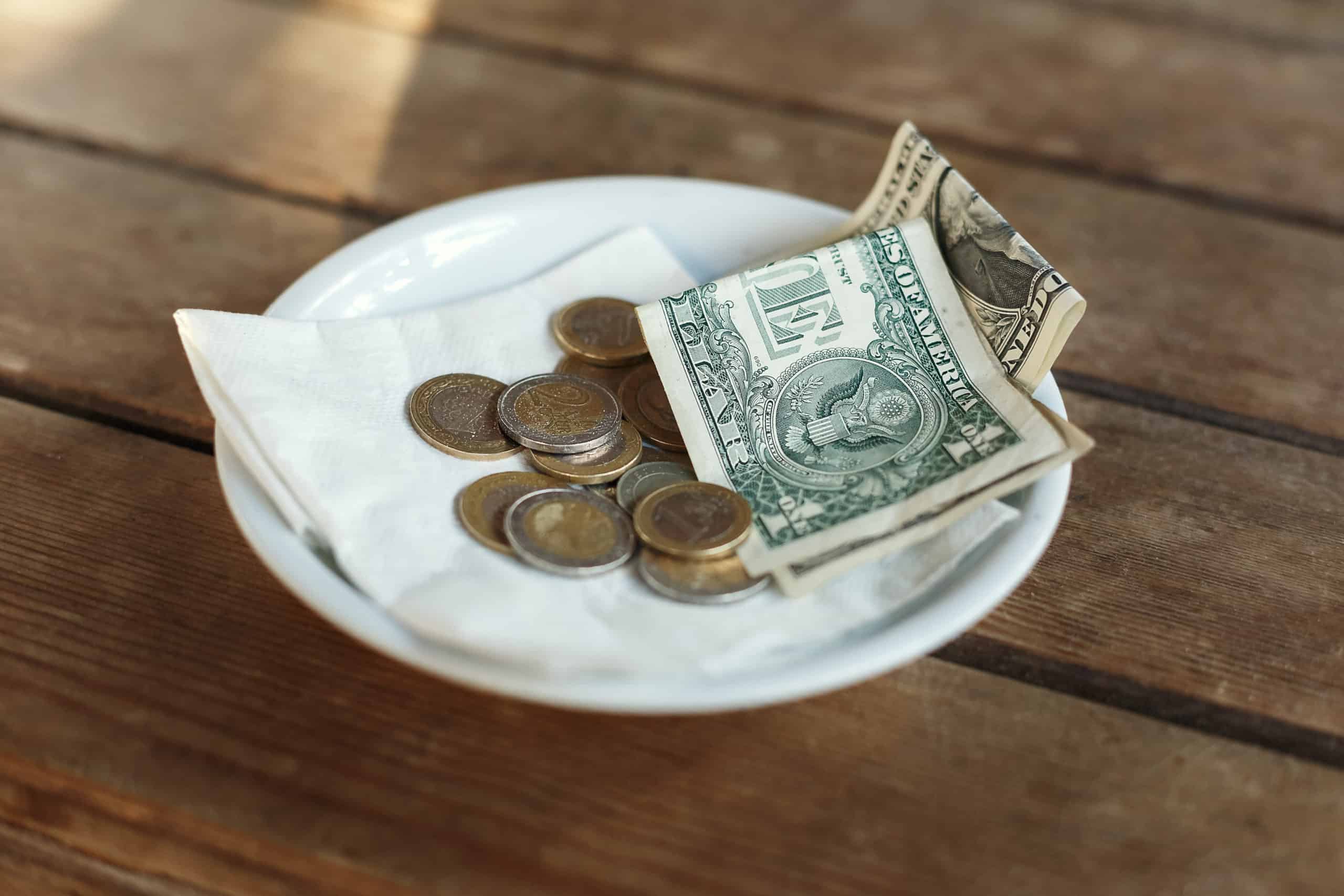One of the first things I research before traveling to a new place is the tipping customs. Nothing is more awkward than making a cultural faux pas by not tipping, tipping too little, or even tipping too much! So where does Dubai stand when it comes to tipping?
Do you tip in Dubai? Tipping is customary in Dubai. You don’t have to tip and you won’t offend people if you don’t, but if you’ve received good or excellent service you should tip. Tipping customs vary by circumstance and profession, and the decision to tip or not to tip will always be at your discretion.
In other words, it depends on the situation. I was able to find a lot of resources online that gave advice on the tipping customs in Dubai. Basically, it seems that workers in Dubai see a tip is an added bonus and not a given right. But there are still some fairly consistent tipping guidelines that will help keep you on the right track during your travels in Dubai and avoid any awkward moments.
Tipping in Dubai in General
Tipping in Dubai is not socially mandatory. If your service was particularly bad then you should by no means feel obligated to leave a tip. If your service was good then 10-15% seems to be a standard amount for a tip. It is also very common to just round up when paying and have the difference act as the tip – this is especially true in coffee shops or the like, but a slightly larger tip is probably more appropriate when dining at a sit-down restaurant.
If your service was excellent then you might consider leaving a larger tip, but don’t feel as though you have to tip above your means. Most workers will be more than happy with a 10-15% tip. There are a lot of wealthy tourists that visit Dubai that leave large tips, you can feel free to tip what you can afford.
When traveling it is important to leave your own cultural expectations behind and respect the customs and beliefs of the places you travel to. In Dubai and the UAE in general, respect is very highly valued. If you treat a worker in Dubai with respect then they will likely appreciate that as much as or more than a monetary tip.
Legally speaking, there is no law in Dubai that says you have to tip. You are free to do as you see fit! If you are really not sure about what you should do, then the best practice is just to observe what is going on around you. Are the other customers tipping? Is your waiter standing by expectantly?
Some services will include information about gratuities in the fine print. Hotels and restaurants may include a 10-15% service fee which will show up as part of the total price. If that’s the case you probably don’t need to tip more on top of that – unless your service was unbelievably good.
It’s hard to give a straightforward answer to whether or not you should tip in Dubai. On the one hand, almost everyone will accept a tip without taking offense or even batting an eye. On the other hand, you won’t be questioned if you decide not to leave a tip.
It’s also worth noting that in many cases your service will be good, great, or even excellent. Dubai is a hotspot for tourists and part of traditional Arab culture is to act as welcoming and gracious hosts. In turn you should be sure to treat all workers with respect, and never forget to give them a big smile and a “Thank You” or “شكرا جزيلا”!
Tipping According to Profession
Now you have an idea of the general expectations when it comes to tipping in Dubai, but expectations will definitely vary based on profession. Here is a break down of tipping customs for some of the common professions you’ll encounter when visiting Dubai.
• Waitstaff: between 10-15%. 10% if service was fine, 15% if it was exceptional. Gratuities may be already included in the price of the meal however, so in some cases it might not be necessary to tip on top of that. However, these pre-included gratuities might not be going directly to your waiter/waitress so it’s best to leave a cash tip if you want to ensure that they are the ones being compensated.
• Taxi drivers: it’s pretty much the standard to always tip your taxi driver in Dubai. They don’t expect much though, only 5-10 AED (approx. $1.50-$2.75 US) or so. It is also acceptable to just round up your fare and allow the driver to keep the change. If the driver is very helpful, perhaps helping you to carry your bags to your destination, you’d want to adjust their tip accordingly.
• Valets: You can tip valets as you see fit. It is customary to tip them in the range of about 5-10 AED, but if you don’t happen to have any change on you, they won’t hold it against you. You can tip the valet when they return your car.
• Hotel staff (bellboys, maids, etc.): When it comes to bellboys it’s kind of the same story as it is for valets. However, if they go above and beyond for you – say you have particularly heavy bags or a large amount of luggage – you should definitely tip them 5-10 AED or more. For maids you should tip between 5-10 AED per night. You can leave this amount on the pillow and they will see it when they come to clean your room and know that it is meant for them.
• Spa/Beauty Therapist: Tips for spa and beauty therapists will vary depending on the service. If you’re getting a haircut or a massage you might consider tipping 10-15% of the price – provided the service was up to snuff! Other smaller spa treatments may merit a tip of 5-20 AED.
• Delivery driver: A keep the change policy seems to be the standard when it comes to delivery drivers. It saves the driver the hassle of making change and leaves them with a little extra money for their trouble. One of the things that might surprise you about Dubai is that you can get almost everything delivered to your doorstep!
• Bartenders: It is actually not that customary to tip bartenders in Dubai. If you are feeling generous you can of course leave a tip, but they may refuse it. You can alternatively offer to buy the bartender a drink as a show of appreciation for their service.
What Currency Should I Use?
When tipping with cash in Dubai, best practice is to tip with the local currency which is the AED: Arab Emirate Dirham (commonly referred to as the dirham). A common amount for a tip is 5 or 10 AED. There is a bank note for both of those amounts. Other AED bank notes are: 20, 50, 100, 200, 500, and 1,000.
You could tip with USD, but it is definitely preferable that you tip with dirhams. You might also be able to pay with your credit/debit card and leave a tip through the machine if you don’t want to exchange any money while you are there.
When possible, you should always tip with cash. This will ensure that the tip is going directly to the person you are tipping. Sometimes if you include your tip in the total payment and pay with credit card, the full sum simply goes to the hotel or restaurant and bypasses the service worker.
Here’s how the AED holds up to a few international currencies (these are all approximations as the market is always fluctuating, but it will give you a pretty good idea):
1 AED = 0.21 GBP
1 AED = 0.24 EUR
1 AED = 0.27 USD
1 AED = 0.36 CAD
1 AED = 1.92 CNY
1 AED = 19.33 INR
Because of the exchange rate, Dubai is actually a very affordable place for North Americans and Europeans to travel. When you think about it, 5 AED is only about $1.50 US, so you definitely won’t be breaking the bank if you’re traveling to Dubai from the US.
How to Tip Like the Locals
Here are some stats on how the locals tip. Based on a survey of 250 UAE residents, it was found that nearly 50% (49% to be exact) tip all the time.
Locals also think it is definitely okay not to tip if you felt like your service was sub-par, as over 50% of the people surveyed said that they only left a tip if the service was good. Most people (about 85%) like the fact that tipping is optional – and they would like for it to stay that way.
Also according to the survey the top 5 professions that most often receive tips in the UAE are:
- Waitress/waiter
- Food delivery person
- Salon technician/hairdresser/beautician
- Cleaner/maid
- Home service companies.
Some of these won’t apply to you if you’re just visiting Dubai, but it’s food for thought!
How Does Dubai Compare?
Dubai is a very international city, and therefore the tipping culture has been affected by outside influence. But how does tipping in Dubai compare to North America, Europe, and other countries in the Middle East?
To me it seems like tipping culture in Dubai is somewhat similar to North American tipping culture – at least as far as amounts go. However, in Dubai you’re very unlikely to run into any negative backlash for not leaving a tip or not leaving enough.
Dubai is different from most of Europe (particularly Northern Europe and Scandinavia) in that service workers aren’t paid that well. So any tip you leave will likely help to supplement the income of workers who make a low salary such as restaurant workers and maids.
A waiter/waitress in Dubai makes on average AED 24,527 per year (approx. $6,700 US). So any supplemental income from tips will be much appreciated. Part of being a responsible traveler and tourist is being aware of your own privilege. If you have the means to tip, you should tip.
Dubai’s tipping customs also differ somewhat from other Arab countries and the rest of the UAE. Workers in Dubai will be less forceful and less aggressive when it comes to tips. In some Arab countries tipping makes up a large part of income so people may become quite insistent.
Dubai is kind of a nice middle-ground between the North American tipping culture and the European tipping culture. It is encouraged to reward someone for doing a good job, but no one expects you to pay extra for a service that didn’t meet your expectations.
Tipping in Dubai Cheat sheet:
Waitstaff (restaurant): 10-15% *check to see if the restaurant has already included a service charge
Waitstaff (coffeeshop): round up or small change
Taxi driver: round up or 5-10 AED
Valet: 5-10 AED
Bellboy: 5-10 AED
Hairdresser: 10-15%
Massage therapist: 10-15%
Spa therapist: 10-15% or 5-20 AED (depending on the treatment)
Delivery driver: round up/keep the change
Bartenders: round up, buy them a drink, or 5-10 AED
Related Questions
Who came up with tipping in the first place?
The origins of tipping are often traced back to 17th century England. Customers would slip a little bit of extra money to the server in order to receive their meal promptly or To Insure Promptness (T.I.P). A tip still has essentially the same cultural connotation: it is an incentive to do a good job and a reward for going above and beyond.
In some countries there is a different name for tipping, for example in France a tip is referred to as a “pourboire” which means literally “for drink.” This is similar to the German “trinkgeld” or the Swedish “dricks.” It’s funny to think of how tipping is perceived in different cultures and how it has become such a quintessential part of our lives. One can’t help but wonder if it will it always be this way?
Why is tipping considered rude in some cultures?
In some Asian cultures tipping is seen as demeaning because it conveys the notion that the receiver needs to rely on the charity of others in order to get by. The same goes for the South Pacific, where visitors are thought of as honoured guests. Would you ask a dear relative to give you money after they stayed with you?
Another place you don’t need to worry about tipping is Scandinavia. Even the taxi drivers don’t expect you to round up and will fetch you the exact change for your fare without skipping a beat. Waiters and waitresses usually take pride in their work and are paid a fair and livable salary. If you tip someone who is paid well for their job, they might feel belittled by the gesture.
Why is it important to get informed on tipping customs when you travel to another country?
Getting informed is one way to be a responsible tourist. Traveling the world is a privilege and we can show our gratitude by making sure that we adopt or at least respect the customs of the places we travel to. It’s easy these days to get on the internet and do a bit of research!
Consider the issue that plagues American service workers in popular tourist cities such as New York. Visitors from European countries – where tipping is not necessarily a given – often leave no tip or a relatively small (5-10%) tip when dining in American restaurants.
This means that the server is missing out on a decent amount of money that will really start to accumulate if it happens again and again. Since servers in the US are not paid that exorbitantly they have really come to rely on tips, and a heavy inflow of non-tipping tourists can make it difficult for them to get by.
Other times, the tourist is the one that is getting ripped off. Sometimes when people notice that you are a tourist they’ll try to pull the wool over your eyes and charge you more than is necessary. For example, in Thailand it is not expected that Thais will tip other Thais, but tourists are definitely expected to leave a tip. The joys of travel!
References:
Suhail, O. (2019, April 25). How Much Should I Tip? Your Guide to Tipping in Dubai – The Home Project. Retrieved from https://servicemarket.com/en/blog/living-in-dubai/how-much-to-tip-in-dubai.
Tipping in Dubai. (n.d.). Retrieved from https://www.visitdubai.com/en/articles/tipping-in-dubai.
Zaki, Y. (2019, March 19). To tip or not to tip in UAE: That is the question… of culture. Retrieved from https://gulfnews.com/how-to/to-tip-or-not-to-tip-in-uae-that-is-the-question-of-culture-1.1552914142904.




